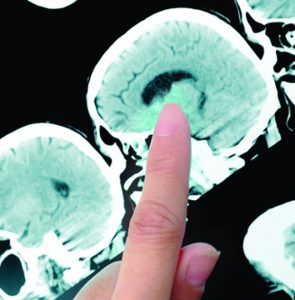

Approximately 35% of patients with PD have depression that is often manifested in the “premotor stage”. It is unclear if this is cause or effect but the mechanism for this is just being understood. It is now presumed that the depression is related to an abnormality in neurotransmitters, abnormal neural signaling, Inflammatory factors as well as Neurotropic factors. It is also believed that the mechanism also involves changes in the Noradrenergic and/or Serotonergic systems. It is not a coincidence that these are the abnormalities that we see in clinical Depression.
Over the past years clinicians have used Tricyclic antidepressants with some success but these, and other SSRI’s and SNRI’s often seem to worsen the symptoms of PD. This often leads to increased suffering for these patients. Fortunately there are now other treatments that have surfaced that are providing relief for these patients. Repetitive Transcranial Stimulation has been found to be useful but it requires a number of treatments in a slightly confining chair that can often be difficult for folks suffering from movement disorders. Ketamine Infusion treatments are now being used and their successes are rewarding.
Recent studies have shown a long lasting therapeutic benefit to reduce the L-DOPA induced dyskinesia (LID) that improve over time as well as decrease the coexisting depression. It is believed that the low doses of Ketamine used act as a “chemical deep brain stimulation that works on desynchronizing the high rate of oscillating hypersynchronous brain activity in parts of the brain.” It also works to increase the amount of glutamate activity that ultimately works on Brain Derived Neurotropic Factor (BDNF) that provides the relief from the depression. The protocols for this treatment parallel those used for the treatment of depression as will be described below.
Using the accepted Ketamine Infusion Protocol of 0.5 mg/kg in 100 cc of Normal Saline, there has been significant improvement in degree of depression, decrease in pain perception and decrease in L-DOPA induced Dyskinesia but no reported adverse effects. There are also reports that many report relief in some of the motor symptoms (LID) as well. Ketamine’s reported action on enhancing neurogenesis and improving brain cell neuroplasticity is now seen to have wider application than previously believed.
Doctors Say ‘Club Drug’ Ketamine
Rescues Suicidal Patients
http://nbcnews.to/2nGd2pP
Find even more at NBCNews.com
Ketamine IV therapy impacts both mood and anxiety and can result in positive treatment outcomes for the following disorders:
• Severe or Chronic Depression
• Bipolar Disorder
• Obsessive Compulsive Disorder (OCD)
• Post-Partum Depression (PPD)
• Post-Traumatic Stress Disorder (PTSD)
• Neuropathic Pain
Psychiatric Associates of Southwest Florida
Dr. Robert Pollack, a Board Certified Psychiatrist, has extensive experience in managing his patients that need this therapy. And he consistently sees the benefit of the Ketamine IV treatment in his patients that suffer from depression firsthand.
Ketamine Therapy coordinated by Dr. Pollack is a safe, reliable treatment tailored to each patient’s unique medical profile. They administer the therapy using state-of-the-art technology, which allows them to monitor and evaluate each patient’s response and progress meticulously.
Psychiatric Associates of Southwest Florida
6804 Porto Fino Cir #1, Fort Myers, FL 33912
Office: 239-332-4700 | TMS & Ketamine: 888-491-4171
About Dr. Robert Pollack
Robert W. Pollack, M.D. CEO is a Florida-licensed Board Certified Psychiatrist. He has been in practice since 1977 and has served the public in many capacities.
The American Psychiatric Association Board of Trustees, January 1, 2015, has granted him Life Fellow status.
Psychiatric Associates of Southwest Florida (PASWFL) is a private solely owned psychiatric medical practice located in Fort Myers, Florida. Dr. Pollack is currently the CEO of Psychiatric Associates of Southwest Florida and resides in Fort Myers. His practice serves people from ages 18 and up. His current special interests focus on the use of Genomics to aid in the determination of the most efficacious way to utilize psychotropic medications as well as the use of rTMS in the treatment of refractory depressions and other psychiatric illnesses.
At PASWFL, appointments are scheduled quickly, within one week of your call. For more information on Ketamine and our practice, please visit our website at www.paswfl.com.
 Southwest Florida's Health and Wellness Magazine Health and Wellness Articles
Southwest Florida's Health and Wellness Magazine Health and Wellness Articles

